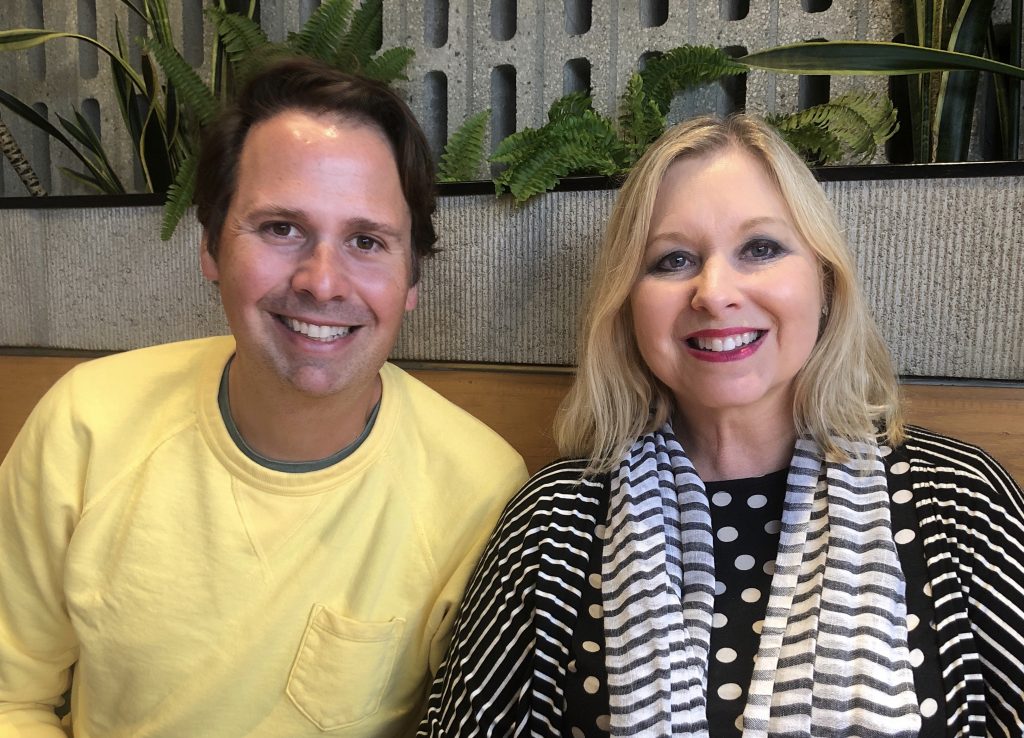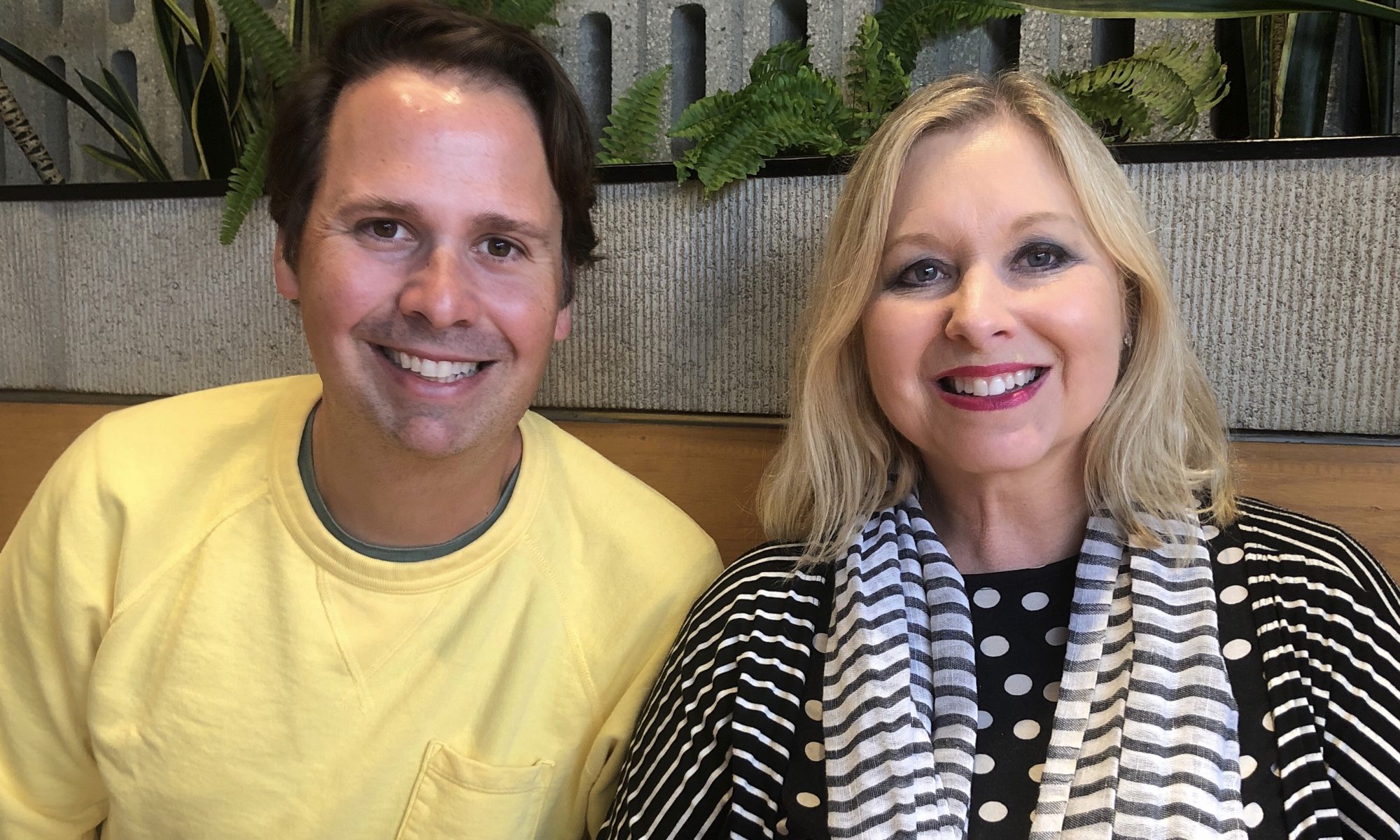Q & A: Screenwriter Tripper Clancy
It’s always gratifying when my former students find professional success in careers they love. I can’t take any significant credit for that, but playing a supporting role in the initial stages seems a little like “paying it forward” out of appreciation for how my teachers nurtured (and nudged) me along.
By this time, I have taught thousands of students, and some of them I remember with surprising clarity.
I remember quite a few conversations with Tripper Clancy during his college days. When I saw Tripper for breakfast in LA a couple of weeks ago, billboards and bus signs and all kinds of other promotional materials for Stuber were all over town. Now, the film is playing at multiplexes everywhere.

flew out of town for rewrites. Busy guy. Means he is working.
Seems like a good time to get some behind-the-scenes information.
Mary: Congratulations, Tripper. It’s not easy to sell a spec script and see it produced! It seems to me that the marketplace is bifurcated these days — big budget sequels and remakes at the multiplex and little independent or international films and documentaries at the arthouses. I really like many of the arthouse picks, but I want more diversity at the big theater chains, too, to expand the horizons of the “mainstream” audience.
Tripper: I couldn’t agree more, and I’d like to think there’s still room for both. I think the biggest issue theatrical releases face today is competition from content that doesn’t require you to leave your house. That means the theatrical experience has to be far superior than anything you can find on your Apple TV or phone, and that’s a high bar to clear. I have projects that are based on IP [intellectual property], and I have projects that are original, some with indie budgets and some with massive budgets. They’re all hard to get made. But if you put yourself in the shoes of a studio exec who needs to make money on a project, there are two general proven paths: either it’s based on IP that has massive brand awareness (see: Marvel) or it has bankable stars. In Stuber, we’ve got an original script based on nothing that stars two actors who aren’t household names. That put us at a huge disadvantage, but I’m grateful the studio was still willing to give it a shot. Sadly, these are viewed as risky investments for major studios, so we’re moving toward a time when a movie like this might only be available on streaming platforms.
Mary: Could you tell me a little bit about the evolution of the story from concept to screen, including the timeline?
Tripper: I first had the idea about a cop post-Lasik surgery needing an Uber driver to chase down a lead in December of 2015. It’s an absurd premise, but it made me laugh, and it made a few other people laugh, too, so I knew I was onto something. By January of 2016, I had written my first draft. I tinkered with it for a couple of months, producers came on board and had a few notes, and then in April of 2016, my agents submitted the script to every major buyer in town. This is referred to as “going out with” the spec. We got a few offers, but the best offer came from 20th Century Fox. Once a studio purchases your spec script, they own it, and they can hire a new writer to come on board and rewrite you. I was fortunate enough to be hired to rewrite my own script, and when our director joined in late 2016, I stayed on and did several new drafts to help meet his vision for the film. There was then a long period of trying to lock down the perfect actors, but once we had Dave Bautista and Kumail Nanjiani on board, it was pretty much off to the races. My work on the script ended early in 2018, but everyone kept me in the loop as it went into production last summer. I went to set for a few days and got to see everything come to life with a 300-person crew.
Mary: For me, Kumail Nanjiani makes the film. He is perfectly cast. Did you have any actors in mind as you were writing? Did you tweak the script any after casting decisions were made?
Tripper: Kumail is brilliant. He can do comedy, drama, and really anything else he sets his mind to. In the first draft I wrote, I had pictured Jonah Hill as the driver, and then I think I had a draft where I pictured Kevin Hart as the driver. In short, I kept tinkering with that character in each pass. Everyone involved loved Kumail and wanted him in the role, but after The Big Sick came out, I think that’s when the studio became convinced that this guy is an incredibly good actor and can absolutely carry a studio movie. I think the Dave Bautista role was originally written for Liam Neeson, but I knew that character could be played by a number of great actors. When Dave came on board, we had seen him in Guardians of the Galaxy, and we were all thrilled.

Mary: The timing for release of Stuber is spot on, seems to me. Three years ago, when you sold the script, I had the Uber app and used it in big cities — like LA where you live — but now I can order up a ride in Jamestown, North Carolina. Uber will resonate with viewers across the country in a way it would not have before.
Tripper: You’re right. Uber and Lyft are a part of our daily lives no matter where we live. Part of the reason I wrote the script in the first place is rideshare services are ubiquitous and in the zeitgeist, and if I could find a clever hook or reason for an Uber driver story to exist, I knew people would be excited to see it. That said, when we did a number of test screenings prior to release, we scored much higher in urban areas where people rely on Uber on a daily basis and a little worse outside of town where it’s less common.
Mary: I remember when you were my student as an undergraduate at Wake Forest University in the screenwriting class, Tripper. After you completed the course, you asked if you could take an independent study course with me to continue writing scripts. You set a goal for yourself to write one spec script in every genre to improve your craft and make yourself more marketable as a writer. I admired that ambition and work ethic enormously and have never forgotten your determination to pursue this path. What is your writing process like now?
Tripper: I took that first class with you my junior year at Wake, and I just never stopped writing. I went to grad school at The University of Texas and wrote another six spec scripts there, and then moved to LA where I took a day job to pay the bills, but kept writing in the morning, at night, on the weekends. I can’t tell you how many people I met in LA when I first moved here that called themselves “screenwriters” but had a really lazy work ethic. I always called myself “an aspiring screenwriter” up until the point I quit my day job and became a working screenwriter. Before I had kids, I’d write seven days a week, always on at least two projects. That way I can spend one day working on an outline or a pitch document and another day working on a revision of a finished draft or something along those lines. It keeps my brain fresh. One advantage I have is I’m super decisive in a script, which allows me to write very quickly. The key for me is sound structure and a good working outline. Once I have that, it generally takes me about a month to write a script, though the revision process, addressing studio notes, can take much much longer.
Mary: In addition to writing the occasional spec script, which is a risky labor of love, what other types of projects do you accept an ongoing basis?
Tripper: Most of what I do is paid work. In the industry these are called open writing assignments (“OWAs”), which basically means the studio already has a project and they need to hire a writer to put words to paper. This might be an adaptation of a novel or it could be an original idea from a studio head or an old movie in their library they’d like to reboot, though most often, it’s a rewrite to an existing script. In those cases, I read the existing script and pitch the studio and producers on the specific way I’d make changes if I’m hired. When you’re first starting out, you’re flattered to even be considered for an OWA. So you jump at the chance to pitch for one, hoping they hire you even if it’s not your favorite project. I made a decision two or three years ago that I was going to try to work only on projects I’d actually go see in the theater or on TV. That decision has helped me branch out away from comedy into more dramatic projects. I recently adapted The Art of Fielding, one of my favorite novels, and I’ve worked on a couple of really cool biopics for Amazon and MGM, and all of those were paid OWAs. That said, I still love comedies and I’ll always want to make people laugh, but I love the challenge of writing across genres.
Mary: Thanks for taking the time, Tripper. I’m so happy for your success and look forward to seeing more of your work! You made me laugh with Stuber, and that is a gift to be sure!!
One thing I know about Tripper that most people don’t — something I remember from a conversation we had outside of Z. Smith Reynolds Library on campus during his undergraduate days — is that his part-time job in college was working at piano bars. He has a terrific ear for music, which landed him those gigs and probably helps a lot now in writing dialogue.
Chalk that up as a fun fact to remember about Tripper Clancy.
